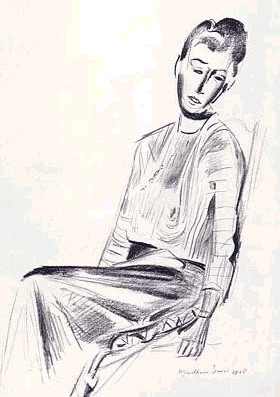from Flashpoint
Yeah. I read a bit of this post by Johnathon Williams in my morning blog constitutional, and liked what I read of Lynette Roberts. I like discovering poets few think of any more (Keith Douglas anyone? Thanks to Ben Mazer for making me aware) or in some cases ever, so this is a great find for me, and I ordered her work.
Lynette Roberts, whose poetry was championed by T. S. Eliot and Robert Graves, might fairly be claimed to be our greatest female war poet, and her work constitutes one of the most imaginative poetic responses to modern war and the home front in the English language. Her first book, Poems, was published in 1944, with a blurb from Eliot, her editor at Faber:
"She has, first, an unusual gift for observation and evocation of scenery and place, whether it is in Wales or her native South America; second, a gift for verse construction, influenced by the Welsh tradition, which is evident in her freer verse as well as in stricter forms; and third, an original idiom and tone of speech. Graves called her “one of the few true poets now writing”; “her best is the best”, he declared, while Eliot praised her poems by that most Eliotic of criteria: that they communicated before they made sense. Dylan Thomas, with his usual waspishness about contemporaries, dismissed her as 'a curious girl, a poet, as they say, in her own right'."
When Roberts died in 1995, aged eighty-six, in a west Wales nursing home, her work had been out of print for nearly half a century, and has gone unregistered in histories of British poetry, even those dedicated to that much-maligned period, “the Forties”. “Oblivion” is too dramatic a word for what happened to her – footnotehood probably captures it better. She features in literary memoirs and correspondence as the wife of Keidrych Rhys, the flamboyant poet and editor of Wales magazine, in the letters of Dylan Thomas (who borrowed Vernon Watkins’s suit to be best man at their wedding), Alun Lewis, Robert Graves and others, and in occasional bibliographies of the period’s poetry. Though always an outsider, she cut a stylish figure on the London artistic scene, and was well connected not just with poets but with artists, photographers and designers. Alun Lewis, with whom she exchanged poems, was captivated, describing her as “a queer girl, [who] wears a red cloak and is unaccountable”. She moved in “New Romantic” and “Apocalypse” circles, encountering poets such as Henry Treece, Kathleen Raine and George Barker, while her husband’s close friendship with Dylan Thomas ensured she saw plenty of literary life’s underside. There are glamorous portraits of her by the photographer Ida Kar, less glamorous ones of her digging her garden in wartime by Douglas Glass (known for his weekly Sunday Times “Portrait Gallery”), and a pencil sketch of her, looking unusually serene, by Wyndham Lewis.
Now that I waggle around Google for a bit, I see there's a fair amount of info out there, though none of her poems. I shall have to fuck copyright over and type a few in here as soon as I can. Such wealth. . .
And then there's James Dickey, all over the place. Just look for him, if you care to. I've read him over and over and over, mostly just a few poems, but 'wild to be wreckage forever' is a line that sustains my perpetual adolescence, or did until I read the often-anthologized Sheep Child, after reading which I laughed until I shat my nice new green knickers and had to sally forth to teach undergraduate CW in my Bugs Bunny skivvies and work boots.
I have often longed to read this poem aloud--as a sort of intro to my work, maybe--at one of those ultra-serious no-one-breathes readings, introducing it by saying, in my best stentorian voice, "THIS, is a poem about the consequences (beat) of sheep-fucking.
There's more to Dickey than sexing up our animal friends though, beyond the Sheep Child and Cherrylog Road and that horrible Nimblewill Civil War thing, there's a decent novel and an early-middle period of generally stellar poems. Post-Deliverance, though, or from about 1972 or 73, it seems he became a parody of himself, though a vastly entertaining one, apparently, to judge by his speaking engagements. The exhaustive and fascinating biography The World as a Lie I also recommend highly.
Check out my dream office:
From The Creative Writing Guide




Comments
Post a Comment